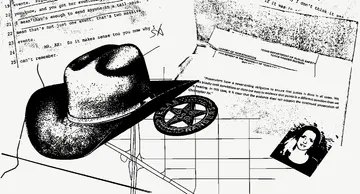Jerry called the day he got out of prison. He had just been released that afternoon, taken in handcuffs to a reentry center on Boston’s South Shore. He was told that the center could help him find a job and get treatment, but he stayed only a few minutes to get directions to the train. A white man in his 50s, Jerry returned to his neighborhood in South Boston to meet his father. He looked for the old man at the station and then tried calling him, feeding quarters into a pay phone. Unable to reach him, he went to a coffee shop to regroup. “I was at a Dunkin’ Donuts and threw an ice coffee into the trash and turned around and saw him,” he said. Jerry had been locked up for 19 years. “I was just standing there. I felt like a convict, holding my little bag. I felt like I escaped.”
I met Jerry through the Boston Reentry Study, a series of interviews my research team and I conducted with people leaving prison and returning to neighborhoods around Boston. Following 122 men and women through their first year after incarceration, we wanted to understand what happens when people return to a community, and the challenges faced by them and their families.
The first days and weeks after leaving prison can be filled with anxiety and loneliness. We called it “the stress of transition.” For some like Jerry, who had a history of drug problems and mental illness, the stress was acute and was associated with unemployment, unstable housing, and reincarceration months later.
Each step in the transition from prison to community is an opportunity for either social integration or isolation. Right at prison release, about half the people we interviewed were picked up from prison by family or friends. The rest set out on a more solitary path, delivered by a prison van to a train or reentry center, or just walking through the prison gates by themselves.
For some, the transition was marked by a welcome-home party. Welcome-home events were organized by mothers and siblings, with family and friends attending. But the parties were thrown more for those whose minds were sound and whose bodies were unravaged by drugs. Two-thirds of those with no history of mental illness or drug addiction reported some kind of welcome-home event just after prison release. Of those with mental illness and drug addiction, only one in six received a welcome-home party
Jerry left incarceration in a prison van and went to a shelter, where his release went uncelebrated. When I talked to him a week after getting out, he said that his greatest difficulty was “dealing with the mental stimulus.”
“It’s very overwhelming,” he said. “You have to understand the situation I was in where for the last 19 years nothing changed. The view, for the most part, the people, the routine — everything was the same. Suddenly, there’s sights, sounds, options, everything all at once. Bam. There’s no transition.”
In the first week after release, about 40 percent of our respondents described feelings of anxiety or panic. They were often distressed by public transport and crowded places like stores and nightclubs. Many respondents stayed off trains and buses for the first few months to avoid being jostled by strangers.
Despair, isolation and all the ensuing limitations could be paralyzing, depleting energy for the dozens of tasks that accompany the first weeks after prison. Getting identification, applying for food stamps, buying clothes, seeing a doctor, going to parole, and countless other practicalities could feel overwhelming.
Prisons, for all their effects, create an important event — leaving — that begins a struggle for social belonging. Freedom after prison is not granted by release, but is attained gradually. Becoming free first requires adjusting to the everyday tasks and interactions of free society and leaving behind the habits of the institution.
After getting out of prison, Jerry spent hours in downtown Boston, watching office workers walk by from the towers around his homeless shelter. I once saw him sitting alone on a park bench while I was interviewing another respondent. He sat for an hour by himself around midday, looking out on the square. He told me of his people watching, “I fall in love with everybody, and no one falls in love with me.”
Perhaps the key lesson of the reentry study says something deep about the nature of incarceration. We usually think of incarceration as a deprivation of liberty, a loss of autonomy. But the men and women leaving prison in Boston were also disconnected from the intimate bonds of family, friendship, work and community. We saw in the stress of transition a strange kind of homesickness that endured even as the respondents returned from prison. Life, and all the relationships that comprise it, felt alien. Until it became more familiar, they were not yet home.
Bruce Western is a Harvard and Columbia sociologist and the author of the recently released Homeward: Life in the Year After Prison.
